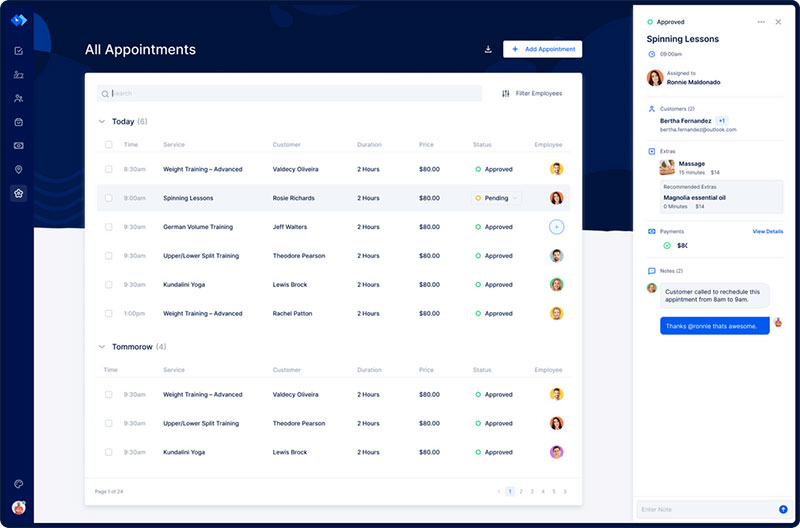Mentoring programs are getting more popular among businesses. They offer fantastic opportunities for career development which brings numerous benefits to all participants.
Organizations achieve specific goals and ensure competent leaders for the future. Mentors gain a new role through which to create new training strategies. They also have the chance to keep up with changes in the industry.
Mentees receive proper guidance, advice, and resources to apply throughout their professional lives. They improve their technical knowledge and experience career development within the program.
Building a plan that merges the objectives of all participants is not easy. In fact, the components of creating a successful mentoring program make it a most challenging process.
Therefore, in this article, you will discover more about mentoring best practices.
The Best Practices for a Successful Mentoring Program
The following steps will help you foster the best mentoring relationships in your company.
Examine the Needs of the Business and Its Employees
Building a successful program requires deep organizational knowledge. You should be aware of business standards, goals, and needs.
Everything should be customized, from the duration to the mentoring system. Thus, these elements will dictate the basic structure of the program.
Talk to the administration to understand their objectives for the mentoring program. Determine which reasons they feel are valid for investing time, money, and effort in this project.
Then, talk to department managers and other employees about their expectations and necessities. Communicate to them how the initiative will also benefit their career goals.
Gain Administration Approval and Commitment
No mentoring program will be successful without the support of the managerial levels. How will other staff members commit to the project if business leaders do not care for it?
A valuable suggestion is to choose one senior executive to represent and promote the program. They should have a good reputation among administrators and other employees alike.
Besides, managers must also be available to take on the role of mentors. You should help them see the need to partake directly in the process. This mindset helps to close the gap between senior and junior workers.
Recruit a Dynamic Manager for Your Mentoring Program
Mentoring programs are complex operations, so assign an employee to focus only on them. They will help participants keep up with the assigned agenda.
Beyond promoting accountability, they should make sure each mentoring relationship is cohesive. Regular meetings with mentors and mentees are also part of their responsibility.
They offer advice, answer emerging doubts, and supply resources and training. Even after the program begins, they use all opportunities to promote it.
The way these managers participate in the project also includes playing the part of mediators. They link the organization to each employee involved by informing administrators of progress.
Define Precise Learning Objectives
Establishing clear goals from the beginning creates direction for the mentoring program, but it is also beneficial to each relationship.
Create a schedule according to the needs and goals of each mentee. Then, consider the ability and skills of the mentors before joining the participants. Following this procedure will help you understand which mentor will connect well with which mentee.
When you define precise learning objectives, you are also managing expectations. Then, mentors and mentees will know what is expected of them from the start.
This way, adapting will be essentially effortless. Plus, it will be easier for participants to maintain focus throughout the process. Keep in mind that all goals should agree with organizational standards and objectives.
Develop Impactful Marketing Systems
Efficient advertising is a crucial aspect of mentoring best practices. Aim to inform and educate employees about the unique opportunity you are offering. It is imperative that you do more than announce your program to each work team.
Tell them about its advantages and how it will help them achieve their career goals. In addition, make the operation as transparent as possible.
You can prepare several marketing strategies to reach your target audience. If they see how beneficial the mentoring program can be, they will feel more motivated to enroll.
Employees must also know what they can do to become participants. Hence, registration should be a quick and straightforward process.
Select the Mentors
Picking good mentors is essential to your success-. Start by analyzing staff members and decide whether to choose them from within or outside the company.
Opting for internal employees will reduce costs and build trust among colleagues. Proactive senior executives make some of the best mentors. Their involvement extends organizational knowledge to lower-ranking employees and interns.
Nonetheless, a good mentor external to the operation will be more impartial and purpose-driven. Their expertise can enhance the ideas and format you have defined.
Reflect on the pros and cons of each alternative, and consider forming a mixed team. Remember that you aim to provide great mentors. They ought to foster progress and offer encouragement throughout the mentoring relationships.
Set Reasonable Schedules
Establishing a meeting schedule boosts productivity and growth. It motivates the mentor to develop more efficient training strategies. The mentee also feels more encouraged to improve their learning.
You do not want mentors and mentees to feel too pressured. But you want them to keep their focus and maintain a sense of urgency.
The programs will depend on the objectives and challenges approached by each relationship. It will vary according to the chosen mentorship method and the need for a deeper connection.
A detailed plan is more than a set of deadlines. It includes specific goals to reach, defines mentoring meetings, and allows for flexibility when needed.
Underscore Flexibility in the Mentorship Program
Good mentoring requires understanding and flexibility. As all employees are different, mentors and mentees will also differ. Their training, development, and challenges will not be the same.
Yet, they all deserve to feel they are valuable to the organization and enhance the mentoring relationship. Being flexible will encourage the mentee to be accountable for their progress. It will support the mentor in creating strategies to boost skill growth.
Among mentoring best practices, flexibility is one of the most impactful. You can introduce it anywhere, from the mentoring methods to the meeting schedule.
Your mentorship success story starts with a scheduling app to streamline your calendar
Staying organized has never been easier.
You can now manage your business and grow your brand with a single, powerful software that keeps all of your appointments in line, your clients organized and your business booming.
Trafft is perfect for business owners who need to streamline their booking experience both for their staff and their clients.
Trafft handles everything for you, even sending automated email or SMS reminders to your clients. No-shows? Not anymore!
The Trafft booking software adapts to different industries for a blissful online booking experience and employee management.
Want to know more? Check out Trafft’s awesome features to see what you are missing.
Nurture Each Mentoring Relationship
Mentoring relationships need nurturing to thrive. The mentees aim to develop their skills and grow their careers. This process also helps mentors understand new roles and avoid becoming stagnant.
Each mentoring relationship also impacts the organization. It helps in meeting its goals and improving its performance. Hence, all these participants have the responsibility to nurture the mentorship.
For example, you can use specific mentoring software to join mentors and mentees. Doing so prevents a mentee from selecting a mentor they already know. It offers them the chance to work with someone else within the company and learn from them.
Throughout all stages, your purpose is the consistent development of all partakers. You can use their feedback to find or create efficient nurturing opportunities.
Prepare to Intervene If a Mentor and Mentee Are Incompatible
Mentoring relationships demand commitment from all partakers. They will not make the expected progress if there are any persistent conflicts.
From the beginning of the program, ascertain if the mentor and mentee are compatible. If the relationship is not meeting their expectations, consider changing colleagues.
Encourage Mentees to Guide the Relationship
The mentor is the one providing training and guidance. Nonetheless, the mentee is a valuable person with significant knowledge and skills.
They present a fresh perspective on the subjects approached. Sharing expertise helps the mentor keep up-to-date with advances and changes in the industry.
Hence, promoting opportunities for the mentee to direct the relationship has a splendid effect. It is an excellent way to foster leadership development and encourage career growth.
A good mentor will give their mentee regular chances to guide the relationship. Then, they will offer constructive feedback and resources for improvement.
Maintaining this type of philosophy throughout the mentoring program generates more fruitful relationships.
Promote a Win-Win Mindset
The win-win mindset is at the heart of mentoring best practices. No matter the program design, its ultimate goal is to offer all parties meaningful benefits.
Although the advantages for mentees are clear, this is not always the case for mentors. Therefore, you can improve engagement by emphasizing how mentoring programs bring valuable assets.
You can also develop systems to show recognition to those who enroll as mentors. Likewise, be mindful of their feedback regarding the program, and try to apply at least some of their suggestions.
Perform Regular Evaluations
Successful mentoring programs rely on honest and positive criticism. So, you must consult with those who participate in them.
You can assess their opinions by using online surveys. Regardless, maintain regular conversations with each mentor, mentee, and program manager.
They will feel more comfortable giving you sincere feedback in person. Besides, they might even share innovative ideas to combat any arising difficulties.
On another note, you can schedule sessions dedicated to evaluating the relationships. Consider meeting with managers, mentors, and mentees separately. It will help you understand how impactful the process has been for the organization and each individual.
Share Mentoring Program Success Stories
Sharing success stories is a rewarding aspect of the mentoring process. It has a massive impact on the organization and unlocks the opportunity for similar initiatives.
Encourage mentees to tell other colleagues about the career goals they have accomplished. This inspirational feedback improves employee engagement.
Additionally, try to motivate mentors to reach out to senior workers. They can share how the program boosted their own career development.
Take Time to Closeout
Closeout is a practice that will offer you the best and worst of the program. It tells you if and how partakers saw mentoring best practices applied.
Listen to understand when a mentor, mentee, or supervisor shares their experience. Promote feelings of appreciation within each relationship.
Furthermore, aim to develop ways to alter any negative features mentioned, doing so will improve future programs.
FAQs about mentoring best practices
1. What is the role of a mentor in professional development, and how does it differ from a coach or a manager?
Individuals’ professional progress depends heavily on mentors, who offer advice and support to help them reach their objectives. Mentors often have a less formal relationship with their mentees than coaches or supervisors do, placing more emphasis on establishing a long-term connection than on producing specific results. Mentors frequently offer their own stories and knowledge, giving mentees a wider view of their profession or business.
2. How can a mentor establish an effective and productive relationship with their mentee?
The foundation of a successful mentoring relationship is mutual respect, open communication, and trust. By taking the time to get to know their mentee, actively listening, and asking open-ended questions to better understand their mentee’s goals, challenges, and interests, mentors may build a solid foundation for their relationship.
Also, it’s critical for mentors to establish clear expectations and boundaries, schedule frequent check-ins, and keep a supportive and upbeat attitude throughout the mentoring relationship.
3. What are some strategies for setting goals and creating a plan for the mentoring relationship?
Together, mentors and mentees should define specific goals and a timeframe for accomplishing them while formulating a strategy for the mentoring relationship.
Mentors can assist their mentees in setting priorities for their goals and breaking them down into actionable actions. Also, it’s critical to develop success indicators and constantly assess how far you’ve come.
4. How can a mentor provide constructive feedback to their mentee in a way that is both supportive and actionable?
Any mentoring relationship should include constructive criticism, but it can be difficult to give constructive criticism that is also useful. Mentors should make an effort to offer feedback promptly and specifically, concentrating on behaviors rather than inherent qualities or features.
Feedback should be given in an uncritical manner and include specific examples and recommendations for improvement. Also, mentors must be receptive to taking feedback from their mentees and use it as a chance for improvement.
5. What are some ways to help mentees build their confidence and develop their skills?
By giving their mentees the chance to expand themselves and take on new challenges, mentors can aid in their development of skills and confidence.
Also, mentors can provide their mentees with advice and assistance in areas where they might be having difficulties, as well as constructive criticism and assistance in coming up with improvement plans.
Also, it’s critical for mentors to acknowledge and appreciate the accomplishments of their mentees.
6. How can mentors tailor their approach to meet the unique needs and learning styles of their mentees?
A flexible strategy that can be adjusted to each mentee’s particular needs and learning preferences is necessary for effective mentoring. It is important for mentors to spend time getting to know their mentees and learning about their unique strengths, limitations, and preferences.
This may entail changing the way they communicate, offering resources and support that suit their mentee’s learning preferences, and being receptive to their mentee’s comments and suggestions.
7. What are some best practices for maintaining a positive and productive mentoring relationship over time?
Both the mentor and the mentee must put up constant work and attention to maintain a healthy and fruitful mentoring relationship.
Best methods include being helpful and responsive, creating regular check-ins, keeping open and honest communication, having clear expectations and boundaries, and routinely analyzing and modifying the mentoring relationship as necessary.
8. How can mentors help their mentees navigate challenges and obstacles in their professional development?
Professional development inevitably involves barriers and challenges, and mentors can be quite helpful in assisting their mentees in overcoming these obstacles.
Mentors can provide advice and encouragement, share their own knowledge and insights, offer helpful criticism, and aid mentees in developing plans for overcoming challenges and realizing their objectives.
In order to cope with stress and setbacks, mentors can also assist their mentees in developing resilience and coping mechanisms.
9. What are some ethical considerations that mentors should be aware of, such as maintaining confidentiality and avoiding conflicts of interest?
When engaging in mentoring relationships, mentors should be aware of a variety of ethical considerations, such as maintaining confidentiality, averting conflicts of interest, and respecting boundaries.
Establishing clear guidelines for secrecy will help mentors avoid disclosing sensitive or private material without their mentees’ express consent.
Mentors should also be aware of any potential conflicts of interest and take precautions to manage or avoid them, such as refraining from offering support or advice that might serve their own interests.
10. How can mentors evaluate their own effectiveness and continuously improve their mentoring skills?
A crucial component of mentoring is evaluating the success of the mentoring relationship. This process enables mentors to pinpoint their strengths and areas for development.
Mentors can solicit feedback from their mentees, use metrics or evaluations to measure progress toward established goals and reflect on their own experiences and insights to identify opportunities for growth and development.
To improve their mentoring abilities and stay current with industry best practices, mentors can also look for further training and resources.
If you enjoyed reading this article about mentoring best practices, you should read these as well:
- What Are Mentoring Circles and How to Start One
- Mentoring Skills You Should Have to Be Successful
- What Are Mentoring Circles and How to Start One




